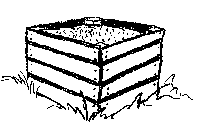


Composting is nature's way of recycling. Many of us already compost & aren't even aware of it! If you leave your grass clippings on your lawn, you are composting. If you rake your leaves into a pile at the edge of your backyard & leave them to rot, you are composting. For the what's, why's & how's of composting, read on... Composting occurs naturally everywhere in nature. Fallen leaves, grass, and dead plants breakdown over time. The dark, nutrient rich, soil-like material that is produced by this breakdown is compost. By composting yard, garden, and vegetable wastes from your home, you can reduce the amount of waste sent to landfills. These organic materials make up almost 20% of the residential waste stream - approximately 330 pounds per person, per year!
Composting creates valuable soil nutrients. When these nutrients are returned to the soil, they are used by trees, grass & other plants to help them grow. Compost also allows soil to hold more water, keeping plants healthy. Gardeners have long used composting as valuable soil additive for lawns, houseplants & gardens. Your kitchen & yard waste serves as food for worms, soil animals & microorganisms. These living organisms help breakdown organic material, such as wood waste, newspaper, vegetable scraps, sawdust, leaves, grass & straw into compost.
1. Select a location for your composting bin. During the summer a shady spot will keep the pile moist; in winter, pick a sunny location to keep the compost warm.
2. Fill bin with kitchen & yard waste. Shredded or chopped waste decomposes faster.
3. To get your pile started, you should add some soil, which contains microbes, to the pile. Microbes are needed for decomposition. Use equal parts of brown (dry leaves, straw, sawdust, newspaper) & green (grass, vegetable scraps) materials to speed up the process.
4. Adjust moisture to compost pile. If pile is too wet, add straw or sawdust; if too dry, add water. The pile should have the moisture consistency of a wrung-out sponge.
5. Check the pile for heat, which is necessary for composting. The temperature of the pile should be between 90į and 140į F (32į - 60į C). If you don't feel any heat coming off the pile after a few days, add more greens to activate the process.
6. Turn the compost pile every four to seven days. The pile needs oxygen to work efficiently. When it seems to be losing its heat, it's time to turn the pile.
7. The pile should begin to shrink and settle. This is a sign that the compost is working properly.
8. If you continue to turn your pile approximately once a week, it should be ready to use in one to two months.
9. When the compost is ready, it should be a dark, crumbly, soil-like material & have a sweet, earthy smell.
10. Feed compost to plants by mixing it with the soil. You can use compost in gardens or potted plants, or as a mulch around shrubs to keep weeds down & help retain moisture.
DO mix finished compost with topsoil to prepare garden or flower beds.
DO mix manure (if available) or high nitrogen fertilizer with yard waste.
DO add lime, small amounts of wood ashes or crushed eggshells to neutralize acids which may form in compost & cause an odor problem.
DO mix grass clippings because they tend to compact.
DO thoroughly mix kitchen waste into pile once depositing to prevent rodents or insects from attraction.
DO add soil to pile to provide a source of microorganisms.
DO use the compost as soon as possible when done. Store in Plastic bag if ground is frozen.
DONíT use unfinished compost. It will rob your plants of nitrogen instead of acting as a fertilizer. You can also spread garden diseases with unfinished compost.
DONíT compost weeds that are heavily laden with seeds, persistent weeds (poison ivy, multi-flora rose, blindweed, quakcgrass, etc.
DONíT ignore strong odors. Simply turn the pile when odors are detected.
DONíT add MEAT, FISH SCRAPS, DAIRY PRODUCTS & KITCHEN VEGETABLES COOKED WITH ANIMAL FATS to compost. They may attract animals.
DONíT add diseased vegetable plants to the compost pile if compost will be used on a vegetable garden. The diseased organism may reappear next year.
DONíT locate a compost pile where drainage is poor or water may stand.
NEVER add human or pet feces.

Warren Co. Cooperative Extension Office & the Penn State Master Gardeners program.
DEP Composting
Click on Topics then Composting
E-MAIL For more information on the Warren Co. Cooperative Extension, the Penn State Master Gardeners Program & composting clinics coming up contact them direct or call: (814) 563-9388 Office Hours: 8:00 to 4:30.
For more ideas on using your compost, as well as helpful hints, do's & doníts & a quick check guide, check out these websites:
Composters.com
The Rot Web
Envirolet Composting Toilets

| HOME | DROP-OFF SITES |
RECYCLING INFORMATION |
RECYCLING INFO LINKS |
|---|
| COMPOSTING | E-MAIL US |
|---|
Reproduction by any means is strictly prohibited.
